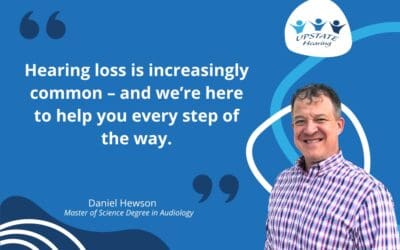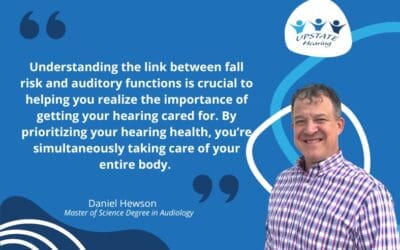Cognitive Screening
Cognitive Screening for Greenville, SC and the Upstate Region
Schedule A Cognitive Screening
"*" indicates required fields
What Is Cognivue Screening and How Does it Work?
Upstate Hearing Aid Center uses Clarity by Cognivue, a specialized tool for cognitive screening. Cognivue screening provides a personalized, consistent, and reliable assessment of overall brain health.
Baseline scores established during your first cognitive performance test allows you and your doctor to monitor and detect changes as they develop or measure the success of interventions already in place.
The features of Cognivue screening include:
- Quick assessments (about 10 minutes)
- Non-invasive
- Interactive and intuitive
- Self-administered
- Immediate results after testing
- Easy to understand results
- Secure and confidential
Unique software algorithms designed to use patient responses in order to adapt the test according to the patient’s performance helps improve testing accuracy of these FDA approved tests by eliminating testing variability.

Frequently Asked Questions About Hearing Loss and Cognitive Decline in Older Adults
Q. What is the link between hearing loss and cognitive decline?
A. People experiencing hearing loss are more likely to develop dementia or Alzheimer’s disease with research suggesting that it may be associated with a faster rate of cognitive decline for several reasons:
- Cognitive load: Untreated hearing loss overworks the brain, which exerts itself to understand sound and speech, slowing the efficiency of the brain.
- Social isolation: Because individuals with hearing loss struggle to hear conversations in a social setting, they tend to stay home, which limits the stimulation of left-brain functions leading to atrophy of that hemisphere.
- Brain structure: The lack of stimulation from processing sound leads to overall brain cell decline.
Q. What are some early signs of cognitive decline?
A. There are several early signs that could suggest cognitive decline, including:
- Memory Loss. Though not all memory problems are the result of cognitive decline; for example, forgetting where you left your keys is normal, but forgetting important events or appointments is not, neither are issues related to recognizing people and places you know well.
- Mood Swings. Unless your hormones are out of balance, emotional outbursts, angry rants, crying, irritability, aggression, anxiety, and depression without a reasonable cause are common early signs of cognitive decline.
- Trouble Concentrating. An inability to focus mentally, like losing your train of thought when speaking, getting confused during conversations, and losing track of the plot in books and movies, which can manifest as impulsive actions, uncharacteristically rash behavior, and poor or illogical judgment.
- Physical Symptoms. Your brain controls your motor skills, so the way you walk, talk, and move can start to change as well. Feeling unsteady on your feet, slurring your speech, sloppy penmanship when you used to have good penmanship, or difficulty flipping the pages of a book.
Q. How do hearing aids help with cognitive health?
A. Several long-term studies indicate that using hearing aids can reduce your risk of dementia. Individuals with hearing loss who don’t use hearing aids have a higher risk of depression and dementia, while those with hearing loss who use hearing aids experience cognitive decline at a similar rate to those without hearing loss.
Essentially, improving your hearing helps you to stay involved in everyday life, which improves communication and social interaction. Hearing aids also improve sound and speech quality, allowing your brain to carry out a broader range of cognitive functions.
Q. How do I prevent cognitive decline, dementia, and Alzheimer’s?
A. If you or a loved one are experiencing some form of age-related cognitive decline, like social isolation or withdrawal, as well as seeing signs of hearing loss, such as turning up the volume on your television or struggling to understand a conversation on the phone, modern hearing aids can significantly slow the rate of cognitive decline. Several studies show that hearing aids help lower the risk factors for dementia and Alzheimer’s.
Q. When should I get a cognitive assessment?
A. Age-related deterioration is among the most common causes of hearing loss, but it often coincides with cognitive decline, especially if your hearing loss has been left untreated. Failure to address these issues increases the risk factors with each decade that passes.
If you’re experiencing the early warning signs of hearing loss, cognitive decline, or both, a hearing assessment and cognitive screening are your best bet for identifying and slowing cognitive decline.
What Do Cognitive Screening Results Show?
In addition to being a cognitive assessment system, Cognivue works as an advanced level tool that helps our doctors develop a highly effective hearing care plan as well as hearing aid selection.
Cognitive screening results from Cognivue provide scores in five areas linked to cognitive capacity. Each of these areas also demonstrate the link between your hearing loss and cognitive decline.
Memory Score
Your memory score reflects your capacity to retain information while processing the same or new information at the same time. This plays a critical role in sorting out complex sentences, following abstract thoughts, and comprehending speech when there is a lot of background noise.
Visuospatial Score
This score also indicates how effectively you use visual cues to process and interpret visual information, but it also relates to your capacity to process complex sentences and distinguish between speakers in a noisy environment by being able to identify where sound or a voice is coming from.
Executive Function Score
Your executive function score is an evaluation of how well you are able to coordinate and control higher order cognitive processes. Executive function guides your level of attentiveness, planning, problem solving, and more, skills that help you focus on a single speaker in a noisy environment or distinguish between multiple speakers talking at the same time, and the ability to focus on speech while ignoring irrelevant distractions during a conversation.
Reaction Time
This timed response demonstrates how quickly your brain coordinates between stimulus perception and response. Responding in an appropriate time frame when sound or speech signals dictate a quick reaction is a critical measurement of your cognitive function.
Processing Speed
Processing speed is another timed measurement that reflects how long it takes you to mentally process a task and relates to your ability to follow rapid and/or complex conversations, especially those taking place in an environment with a great deal of background noise.
Schedule a Cognitive Screening at Upstate Hearing
Many of our patients have put off addressing their hearing loss for some time, so some of them begin to develop early signs of cognitive decline by the time they come to us for a hearing assessment. Upstate Hearing Aid Center makes use of Cognivue screening to provide the best possible hearing care to meet your specific hearing loss and address issues related to cognitive decline to help improve your quality of life.
If recall, decision making, organizing tasks, a poor sense of direction, or other cognitive related issues are becoming a challenge for you or a loved one, contact us to schedule a cognitive screening using the adjacent form.
"*" indicates required fields

Ask The Experts
Auracast Technology: What Does It Mean for the Future of Hearing Aids?
Have you been to a concert, conference, or other large place full of people recently—and been immediately overwhelmed with how bad your hearing becomes when surrounded by people? You’re not alone—94 percent of participants in a UK survey by Hear It reported poor...
Am I Too Young to Have a Hearing Loss?
Hearing loss is often associated with old age, as many people believe that it’s something only older people experience. Age-related hearing loss is indeed prevalent for older individuals, but many younger people report some level of hearing loss. Exciting concerts,...
The Link between Auditory Function and Fall Risk
If you’re dealing with a hearing loss challenge, the rest of your body will be affected in more ways than one. Social isolation, dementia, and cognitive decline are all at higher risk for individuals with an untreated hearing loss – as well as falling, which the...



